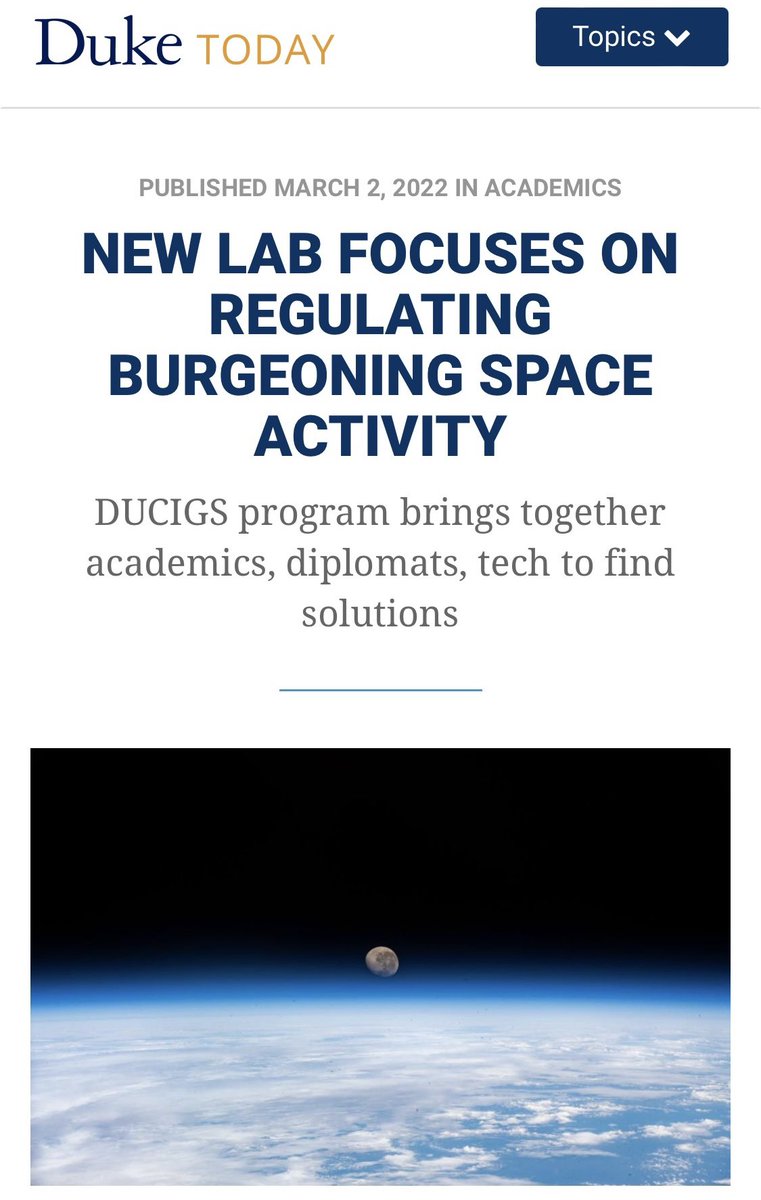
🧵 [1] 🛰 Proud to announce the launch of @DukeU’s SPACE DIPLOMACY LAB - a new program I’ve co-founded at @DUCIGS from my perch @Harvard @CenterForAstro
Our 1st Focus: How will 🇷🇺’s invasion of 🇺🇦 impact space cooperation & how can SpaceTech help 🇺🇦 now.
today.duke.edu/2022/03/new-la…
Our 1st Focus: How will 🇷🇺’s invasion of 🇺🇦 impact space cooperation & how can SpaceTech help 🇺🇦 now.
today.duke.edu/2022/03/new-la…

[2] Recently my @DUCIGS Space Diplomacy Lab Co-Director Prof Giovanni Zanalda & I hosted a roundtable focused on space issues posed by 🇷🇺‘s war on 🇺🇦 & long-term space security challenges w/ space media leaders @LorenGrush, @RaminSkibba & @Jeff_Foust:
👇👇

👇👇

[3]🚀Recall in Nov, during Russia’s military buildup around Ukraine, the Russian military launched a reckless direct-ascent anti-satellite test, that created a major space debris event & endangered US, EU & Russian personnel on International Space Station
nytimes.com/2021/11/15/sci…
nytimes.com/2021/11/15/sci…
[4] My @DukeU teammate Amb. Bob Pearson & I wrote about it in @ForeignPolicy, & it’s connection to Russia’s then potential invasion of Ukraine, 🇷🇺’s weaponization of space, energy, corruption, etc & called for a global Summit for Space Security in 2022:
foreignpolicy.com/2022/01/01/spa…
foreignpolicy.com/2022/01/01/spa…
[5] I also wrote about the Russian military’s direct-ascent anti-satellite weapons test in the context of Russia’s behavior endangering norms for the peaceful use of outer space & Moscow’s disinfo claiming “🇷🇺 not engaged in militarizing space” for @CEPA:
cepa.org/trashing-the-n…
cepa.org/trashing-the-n…
[6] Since Russia’s invasion of Ukraine began last month, space diplomacy issues have been on full display, from President Biden deploying sanctions aimed at “degrading” the Russian space program:
spacenews.com/biden-sanction…
spacenews.com/biden-sanction…
[7] To Roscosmos’ Dmitry Rogozin’s histrionic reaction to said US #SpaceTech sanctions:
“Who is going to save the International Space Station from an uncontrolled descent from orbit & falling onto the territory of the US or EU?”
reuters.com/world/europe/n…
“Who is going to save the International Space Station from an uncontrolled descent from orbit & falling onto the territory of the US or EU?”
reuters.com/world/europe/n…
[8] To @SpaceX @elonmusk opening Starlink satellites for urgent use by the Ukrainian government & people including continued delivery of ground based terminals to help ensure internet coverage to 🇺🇦 during 🇷🇺’s invasion of the country:
space.com/elon-musk-spac…
space.com/elon-musk-spac…
[9] More broadly, Space Diplomacy Lab will contextualize space issues from the daily news cycle in terms of long-term, anticipatory diplomatic strategies aimed at achieving confidence-building measures needed to avoid future conflict in space.
[10] Space Diplomacy Lab will focus on an array of global space security challenges, includ. from Moscow & Beijing, & diplomatic solutions for:
🚀Space Weapons & Debris
🚀Greater private access to earth orbit
🚀Satellite Mega-constellations
🚀Deep space extractive industries
🚀Space Weapons & Debris
🚀Greater private access to earth orbit
🚀Satellite Mega-constellations
🚀Deep space extractive industries
[11] As a new era of human space activity is unfolding every day before our eyes, Space Diplomacy Lab will continue to host events and publish analysis building on work already started under the @DUCIGS “Rethinking Diplomacy” framework, including:
[12] Last April, @DukeU Amb Bob Pearson and I wrote for @ForeignPolicy about the need for urgent anticipatory diplomacy to address vital space security issues, the need for which was sharpened by Beijing’s uncontrolled reentry of its Long March 5B rocket:
foreignpolicy.com/2021/05/15/spa…
foreignpolicy.com/2021/05/15/spa…
[13] Last November, I wrote an analysis for @CEPA of the national security dangers and challenges of space debris in low earth orbit, and the need for global cooperation by policymakers on the scale of climate responses to address the threat:
cepa.org/earths-destruc…
cepa.org/earths-destruc…
[14] Last June, I also wrote for @CEPA about the state of the Russian space program Roscosmos, and toll that US #SpaceTech sanctions already in place against Russia following its 2014 invasion of Ukraine had been taking on Roscosmos’ capabilities:
cepa.org/space-the-incr…
cepa.org/space-the-incr…
[15] In November, our team was joined by @ProfHughLewis in an event entitled “That's No Moon: Technical & Diplomatic Solutions to the Space Debris Challenge” joined by Space Diplomacy Lab affiliate Prof @BrittLundgren @newsUNCA & Prof Laura Newburgh @Yale
igs.duke.edu/news/experts-u…
igs.duke.edu/news/experts-u…
[16] Last June, we also held a webinar with Amb Bob Pearson, Prof @BrittLundgren, Prof Giovanni Zanalda, and myself in partnership with @DukeinDC discussing the urgent need to develop international norms to avoid a future crisis in space:
igs.duke.edu/news/why-we-ne…
igs.duke.edu/news/why-we-ne…
[17] We will announce more programming soon for upcoming events and partnerships, including a space debris hackathon with @scipolnetwork, and our team speaking at the annual @MeridianIntl Diplomacy Forum in April in Washington focused on space security:
diplomacyforum.meridian.org
diplomacyforum.meridian.org
[18] For more on the full range of @DUCIGS Space Diplomacy Lab analysis and programming, please check out our new website below. We look forward to welcoming you to further space policy programs in the future…until then:
🌎🌓🪐🔭 #KeepLookingUp‼️
[END]
sites.duke.edu/spacediplomacy…
🌎🌓🪐🔭 #KeepLookingUp‼️
[END]
sites.duke.edu/spacediplomacy…
• • •
Missing some Tweet in this thread? You can try to
force a refresh




